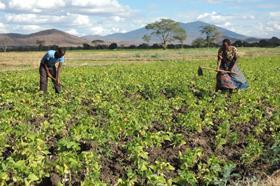
The International Fund for Agricultural Development (IFAD) is set to provide funds to assist 6,240 vulnerable small-scale farmers in rural Tanzania impacted by the Covid-19 pandemic.
The IFAD grant will reportedly help farmers access inputs, provide market linkages and access agricultural and market information to boost their productivity and resilience.
Thanks to the combination of a recent locust infestation and the Covid-19 crisis, growth in Tanzania’s agricultural sector was forecast to decline from 5 per cent in 2019 to 2 per cent in 2020.
This decline has increased the cost of inputs and limited access to markets, with small-scale farmers bearing the brunt.
IFAD will provide US$882,841 through its Rural Poor Stimulus Facility (RPSF) to assist farmers at a crucial moment for the country.
A press release from IFAD stated: “At this time when the Covid-19 crisis threatens to push another 500,000 Tanzanians into poverty, the grant aims to minimise the impact on livelihoods, resilience and food security. It will target farmers - half of whom will be women and 30 per cent youth, as well as agro-dealers, off-takers and extension officers in Dodoma, Njombe, Simiyu, Singida and Unguja regions.”
Despite low yields, crop cultivation remains the main economic activity for most small-scale farmers in Tanzania.“To help boost their productivity, the grant will distribute 23,650kg of bio-fortified maize seeds, 14,460kg of sunflower seeds and 971,000 seedlings of fruits and vegetables,” IFAD stated. “In addition, the grant will help safeguard the gains made under the Marketing Infrastructure, Value Addition and Rural Finance Support Programme (MIVARF) - an IFAD supported project that closed in 2020 – by using its existing agro-input distribution system to reach the targeted farmers.”
“The Covid-19 pandemic has brought to light the vulnerability of our food systems,” said Francesco Rispoli, IFAD country director for Tanzania. “To ensure we build a sustainable and resilient food system, we need to recognise the role small-scale farmers play and empower them to access inputs, information and markets for their produce.”
To assist small-scale farmers struggling with the recent border closures and strict Covid-19 protocols, the grant will also leverage existing MIVARF platforms to link farmers to alternative markets.
The grant will also support the scaling up of the M-Kilimo platform, a mobile-based agriculture application that helps farmers to access extension and advisory services and market-related information.
IFAD has financed 16 rural development programmes and projects in Tanzania since 1978, directly benefiting more than 4m rural households.



